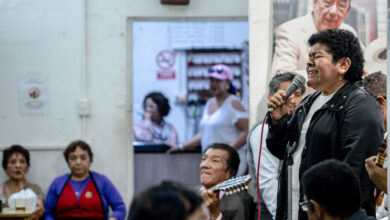Peru’s Judicial Branch Reinstates of Fujimori’s Controversial Pardon
Peru's constitutional court reinstates the pardon of ex-President Alberto Fujimori, sparking debate over justice, human rights, and the legacy of his presidency.

Photo: Presidential message from Alberto Fujimori on April 5, 1992. Youtube
The Latin American Post Staff
Escucha este artículo
Leer en español: Poder Judicial de Perú restablece polémico indulto a Fujimori
Peru's judiciary decision on Fujimori's pardon
In a move that has sent shockwaves through Peru's political and legal landscapes, the country's constitutional court has reinstated the pardon granted to former President Alberto Fujimori. This decision, announced by the court's chief judge Francisco Morales, overturns the annulment of Fujimori's pardon, which was decreed last year.
Fujimori, a figure who continues to polarize Peruvian society, was convicted of human rights abuses and corruption during his presidency in the 1990s. Initially granted on humanitarian grounds due to his ill health, the pardon had been a subject of intense legal and moral debate in Peru.
In a statement to RPP, a local radio station, Judge Morales declared, "Alberto Fujimori must be released by the decision of the constitutional court." This announcement paves the way for Fujimori's release and rekindles a complex discussion about justice, political reconciliation, and the country's dark history of human rights violations.
Fujimori's Complex Legacy
Fujimori's presidency lasted from 1990 to 2000 and was marked by economic reforms and authoritarian practices. While he was credited with stabilizing Peru's economy and quelling the Shining Path insurgency, his tenure was also marred by widespread allegations of human rights abuses, including extrajudicial killings and suppression of political dissent.
The initial pardon, issued by then-President Pedro Pablo Kuczynski in 2017, had been seen by many as a political maneuver, part of a deal to avoid Kuczynski's impeachment. Therefore, the annulment of the pardon in 2018 was received as a restoration of justice by human rights activists and victims' families. However, this latest reversal by the constitutional court has reignited a debate about the balance between political expediency and the pursuit of justice.
The decision has been met with a flurry of reactions. Supporters of Fujimori, who see him as a hero who saved Peru from economic collapse and terrorism, have welcomed the court's ruling. They argue that the 83-year-old ex-president, suffering from health issues, deserves to live his final years outside prison.
Divergent Reactions
On the other hand, human rights groups and families of victims of the Fujimori regime's atrocities have expressed dismay and outrage. They view the court's decision as a blow to the fight against impunity and a disregard for the suffering of those who were subjected to human rights violations under Fujimori's rule.
The court's ruling also raises questions about Peru's judicial independence and the legacy of Fujimori's governance. Critics argue that the decision reflects the enduring influence of Fujimori's political network, which, despite his conviction, continues to wield significant power in Peruvian politics.
Furthermore, this development comes when Peru grapples with political instability and a crisis of confidence in public institutions. The reinstatement of Fujimori's pardon adds another layer to the country's ongoing struggle with its past and the challenge of forging reconciliation and justice.
Internationally, the decision has drawn attention to Peru's commitment to upholding human rights standards. Global human rights organizations and foreign governments, particularly those in Latin America, are closely monitoring the situation, concerned about the precedent this might set for the region.
Impact on Peru's Democratic Journey
In the coming days, Peru will likely see a mix of public demonstrations in support of and against the court's decision. This situation underscores the deep divisions in Peruvian society and the complex legacy of Fujimori's presidency.
Also read: Peru has Lost 56.22% of its Glaciers in the Last Six Decades
In conclusion, the reinstatement of Alberto Fujimori's pardon is more than a legal ruling; it reflects the ongoing struggle within Peru to reconcile its tumultuous history. As the nation grapples with this decision, the debate over justice, memory, and the rule of law continues to shape Peru's democratic journey. This episode in Peru's history will undoubtedly leave an indelible mark on its quest for justice and the rule of law, posing significant questions about the future of its judicial and political systems.


